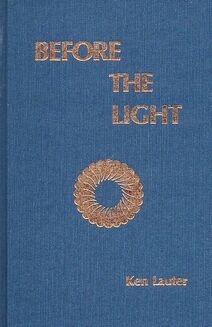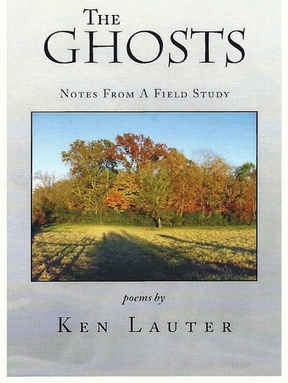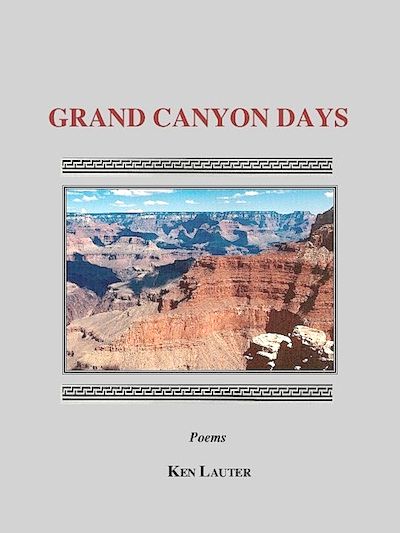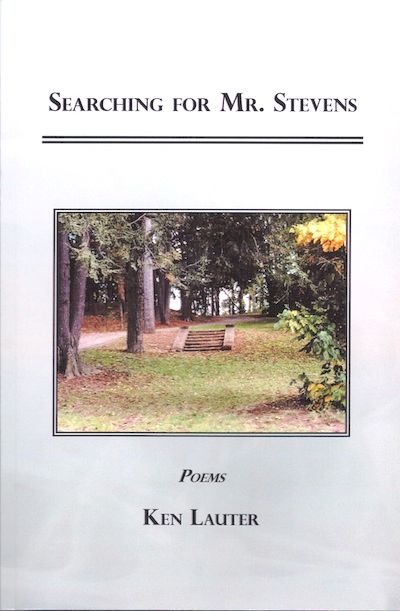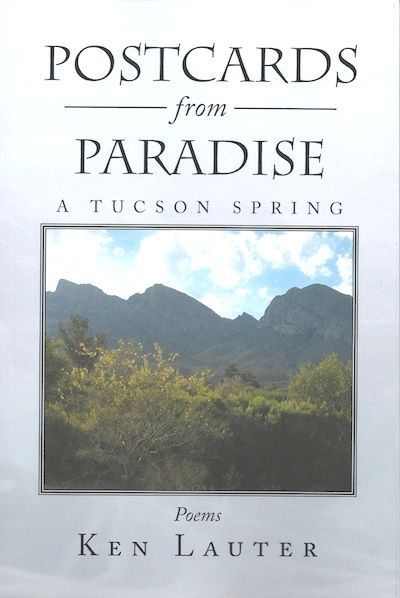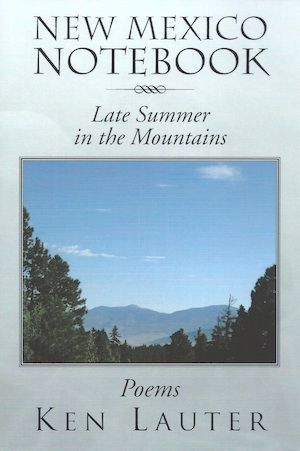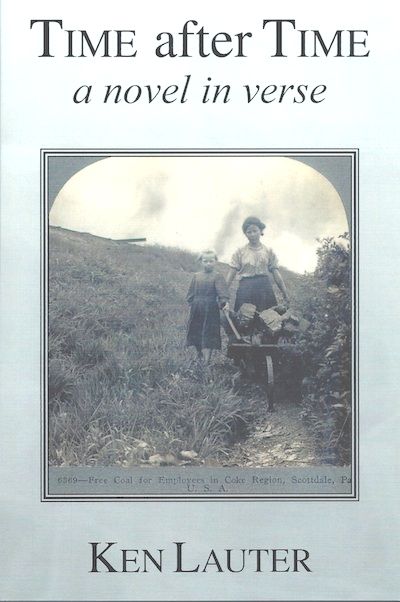POETRY
- from BkMk Press, University of Missouri at Kansas City
The Other Side - 1973
Before the Light - 1987
- from Xlibris
The Ghosts – Notes from a Field Study - 2009
Songs from Walnut Canyon - 2010
Grand Canyon Days - 2011
Searching for Mr. Stevens - 2011 (review in The Wallace Stevens Journal, here)
Structure of the Body - 2012
First Kingdoms – Poems from a Vanishing Landscape - 2012
Vermeer in Words - 2013
Postcards from Paradise – A Tucson Spring - 2013
New Mexico Notebook – Late Summer in the Mountains - 2014
Time after Time – A Novel in Verse - 2014
50 Years - Poems for My Wife - 2017
Out of the Gate - Selected Early Poems 1960 - 1970 - 2017
Interrogations - Poems Posing Questions - 2021
Cosmic Questions - Poems in Our Galactic Moment - 2021
In the Company of Animals - Poetry & Prose on the Plath to a Peaceable Kingdom - 2023
- from Stephen F. Austin State University Press
The Ratlue Diaries - Two Poets & the Rocking K Wars in Tucson AZ - 2017
IN PROGRESS (with working titles)
Mortality and Other Hassles
On the Wall and On the Page - poems on paintings, sculpture, & photographs
Fast Break - A Poet's five Decades of Pick-up Basketball
Poet in Cow Town - My Kansas City Years
Poet in City Hall - My St. Louis Years
Poet in Sonora - My Tucson Years
Poems Without a Home - Random Messages from the Muse
Afterthoughts - Poems That Came Later
Ungodly Poems - Some Useful Heresies
- Scroll down for more information, excerpts, links, & ordering info.
The Other Side - 1973
Before the Light - 1987
- from Xlibris
The Ghosts – Notes from a Field Study - 2009
Songs from Walnut Canyon - 2010
Grand Canyon Days - 2011
Searching for Mr. Stevens - 2011 (review in The Wallace Stevens Journal, here)
Structure of the Body - 2012
First Kingdoms – Poems from a Vanishing Landscape - 2012
Vermeer in Words - 2013
Postcards from Paradise – A Tucson Spring - 2013
New Mexico Notebook – Late Summer in the Mountains - 2014
Time after Time – A Novel in Verse - 2014
50 Years - Poems for My Wife - 2017
Out of the Gate - Selected Early Poems 1960 - 1970 - 2017
Interrogations - Poems Posing Questions - 2021
Cosmic Questions - Poems in Our Galactic Moment - 2021
In the Company of Animals - Poetry & Prose on the Plath to a Peaceable Kingdom - 2023
- from Stephen F. Austin State University Press
The Ratlue Diaries - Two Poets & the Rocking K Wars in Tucson AZ - 2017
IN PROGRESS (with working titles)
Mortality and Other Hassles
On the Wall and On the Page - poems on paintings, sculpture, & photographs
Fast Break - A Poet's five Decades of Pick-up Basketball
Poet in Cow Town - My Kansas City Years
Poet in City Hall - My St. Louis Years
Poet in Sonora - My Tucson Years
Poems Without a Home - Random Messages from the Muse
Afterthoughts - Poems That Came Later
Ungodly Poems - Some Useful Heresies
- Scroll down for more information, excerpts, links, & ordering info.
Poetry: Morphology
It is nothing
yet - a lull,
a buzz of potential.
Warm in pale green
fluid it floats,
amorphous, without age.
Then the green
swirls and foams
flings it up, out
into a stinging blue
dazzle and sharp
immobile lines.
The sea gushes.
Stuck in the rocks
something wants breath.
Now it crawls across the sand
and aches with metamorphosis
already acquiring contours
and a steady pulse.
|
Three narrative poems: The Classic, The Killing, Before the Light BkMk Press, U Missouri at Kansas City, 1987 - hardcover, 47 pages A dark world is explored in these sequences: 1) a "snuff" film; 2) the murder of a mentally retarded son by his father, and; 3) the making of the atomic bomb as perceived by the wife of one of the secretive scientists at Los Alamos. Copies available from author; use email icon top of this page |
from The Classic
Moving Pictures
The projector whirrs on
the sound track sounds
the images live, defy
common sense again, just as
that first proof did:
the racehorse stepping, stepping
all four feet at once up
sailing over the ground.
You don't see rehearsal.
You don't see technology
or culture unreeling.
You see yourself larger,
simplified. You see time
compressed, understandable.
There in the
crowded dark you love it.
You don't care
what the story is.
from Before the Light
Aurora
Aurora
over mountains
warms the plateau
spills slow
down the canyon:
black rock
crumbles, frosted grass
shifts, pinon, Ponderosa
grow and hear
the creek speaking
against pebble and ice.
If
anyone is here
they know the light
is coming
up the canyon,
know they will see
one more time
the cold gold explosion
in the cottonwoods.
- Bandelier, New Mexico / October 1983
|
Poems Xlibris, 2009 - 99 pages cover & interior photos: Judith Lauter softcover - or ebook Is an anthropology of ghosts possible (or even desirable)? What would it be like? The Ghosts offers ironic and richly imaginative answers to such questions, taking us to a country both familiar and exotic, disturbing and yet often strangely reassuring. The poems posit that ghosts may not be so different from us, nor as removed from earthly concerns as we would like to think. |
Their Origins
The evidence clearly suggests
they came from the stars.
Just how and when may
never be known -- no more
than we may know which
of our body's molecules
came from our sun and which
from somewhere else entirely.
|
Xlibris, 2010 - 83 pages softcover - or ebook Songs from Walnut Canyon brings the reader into a world of natural beauty, geological wonder, history, and myth. Many composed in the canyon near Flagstaff AZ, these poems are songs of the present that evoke songs past - in the daily lives and music of those who once inhabited the canyon, and in the voices of Crow, the Corn God, Flute Player, and Last Singer. Walnut Canyon is an amazing place. This books honors that fact and suggests why it is. |
Last Singer
(1200 A.D.)
I am the last
I will stay
here
sit in the sun --
white rock
gray rock
blue sky
silver wind
canyon song
rising.
|
Xlibris, 2011 - 87 pages softcover - or ebook The poems of Grand Canyon Days explore one of the world's great geological wonders-- its past and present, its rock, waters, plants, and animals. The book spans fifty years of the author's life and reflects on our national identity and the Canyon's lingering sense of myth from earlier eras. Along the way, we meet John Wesley Powell, ancient canyon residents, and a couple of ordinary American tourists. The book takes us into a deep place and deep thoughts about the social, environmental, and spiritual legacy of canyons. |
Canyon Dawn
Through frigid hours, from uncountable
stars uncountable light years distant, pale
photons rain all night into the canyon.
Finally, from the east, our own star rises
above the white curve of Kaibab limestone,
its light pouring over the plains to flood
down the crumbling esplanade, splashing
out over Tonto Platform peninsula,
pausing at the rim of the inner gorge
and cascading down to the river whispering
in its dark Precambrian channel. The light
grows stronger. Dry heat climbs the walls.
Ahead is another day of hikers, copters,
and noise. Above the heat, beyond the blue,
the stars burn on - bringing other dawns.
|
Poems ( one by Judith Lauter) Xlibris, 2011 - 101 pages softcover - or ebook Searching for Mr. Stevens probes the art and mind of the brilliant, enigmatic Wallace Stevens. An unique figure in 20th century letters, and possibly the only American poet to have a "Friends and Enemies Society" named for him, Stevens wrote some of the most haunting verse in the English language -- as well as some of the most maddeningly obscure. His paradoxical personal and professional life has come to loom almost as large as his poetic achievement, and this book looks at all these elements. Lover of Stevens will find here fresh angles from which to explore this dazzling American Master. Review: J. Finnegan (2013), The Wallace Stevens Journal 37(2): 251-253. |
Relative Seasons
Winter depends on your exact spot
on the earth -- a few degrees
of sun-angle changes everything.
Wallace Stevens, for instance,
took winter right between the eyes
every time, as if there were only
Connecticut on the one hand
and on the other, Florida.
There are other locations. There is,
for instance, Oklahoma, where
I write another season, noticing
how in December the grass
under snow around blackjack oaks
inspires voluptuous
coronas of green.
Winter depends on your exact spot
on the earth -- a few degrees
of sun-angle changes everything.
Wallace Stevens, for instance,
took winter right between the eyes
every time, as if there were only
Connecticut on the one hand
and on the other, Florida.
There are other locations. There is,
for instance, Oklahoma, where
I write another season, noticing
how in December the grass
under snow around blackjack oaks
inspires voluptuous
coronas of green.
|
Poems, (including three by Judith Lauter) Xlibris, 2012 - 134 pages softcover - or ebook A poetic survey from many perspectives, The Structure of the Body examines the human form as an anatomical and physiological system and as a metaphor for other dimensions of our lives. The book covers the body's evolution, its vast array of organs, its role in our mental and emotional life, and its complex interface with birth and death. These poems open fresh vistas on a familiar yet always mysterious subject. |
The Life of the Body
The fluoroscope shows us
as a halo -- only the bones
last a while -- but before
we shrug it off
like a robe
and step out of time
into senseless forever
we must do the beast
homage: keep every cell
well fed, give all
the playful parts lots
of play, and try not
to cry in front of
your wrinkles -- they are
so shy that they can
turn evil easily and burn
into the real florescence:
the you beyond all scope.
|
Poems Xlibris, 2012 - 113 pages softcover - or ebook Like Blake's Songs of Innocence and Experience these poems evoke childhood moments -- from the dreamlike states of infancy to the exhilaration of nature, animals, games, school, sex, and the early discoveries of love. Such elusive memories are screened through the double lens of a boy's innocence and an adult's more complex awareness. In the poet's personal history, First Kingdoms records and celebrates a type of childhood less and less known to today's digitally-obsessed generations. |
Crib
What bars are these?
What hard brown wood?
Why are you
penned in here?
You are cold, hot,
screaming, bored
to tears— and
who are these
giants who ignore
me, me, me!
Mother
Mother is hanging the sheets out to dry
on a backyard line propped up
by a long pole with a notch. You help.
You hand her the linens and clothespins.
She swings the damp rectangles up, up
over the wire clothesline, pulling pins
from her teeth, snaps on one after another.
You gaze up at her, admiring, envying
her strength. She merges with the sun.
The Rifle
The bolt-action, single-shot Remington .22
is a Christmas present from your Dad
that you never asked for. He says it will
teach you something about responsibility.
You slide a cartridge in, carry the gun out
onto the back porch, and in the frosty air,
take a bead on a sparrow fifty yards away.
Pop! — the bird drops like a stone.
Trembling, you bury the bird in the woods.
For days, you hate yourself— and your dad.
|
Poems (one by Judith Lauter) Xlibris, 2013 - 106 pages (8.5" x 11") 25 Vermeer color paintings softcover or ebook Vermeer in Words explores the inner workings of the Dutch master's paintings, articulating their aesthetic principles and revealing some of their deeper intimations. For context, the poems and paintings are interleaved with brief passages describing 17th century Dutch history, art, and society. What emerges is a celebration of Vermeer's unique gifts, while plumbing his personal predicament, values, and artistic achievements. Vermeer lovers will find the book a uniquely rewarding experience. |
Vermeer in Miniature
Born the second child
of Reynier Janzoon Vos
and Digna Baltens
not long after the Spaniards
stopped their slaughtering
and burning, you
never even considered
leaving Delft. You were
painting hard when Holland
turned Protestant and you
turned Catholic, mainly
to marry Catharina Bolnes
and make fifteen babies -
four dying young, while
you painted slowly, every day,
each fleck of pigment
as precious to you
as the spermatozoa
and red blood cells
van Leeuwenhoek saw
swimming under his fine lenses.
When you died penniless,
Catharina hired him as an agent
to sell off all your paintings.
Girl with a Pearl Earring
She turns away
from the black,
and glances
over her shoulder at us.
Except for the studio where
she and the painter work,
the house is crowded, noisy,
children running in and out,
stew bubbling in a pot.
On the street outside,
war drums thud by in foggy air
and in the murky alleys of
Amsterdam and Rotterdam
pools of microbes fester.
Storm clouds are rising
over the North Sea,
dikes are leaking, crumbling--
and Vermeer is hard at work
painting, saying:
This girl— this
pearl beyond price--
is stronger
than the dark.
|
Poems Xlibris, 2013 - 84 pages softcover or ebook The poetic diary of a 6-week visit to Tucson, Arizona, by a couple in their 47th year together, as they return to the city where they were married and lived for a total of ten years, first in the 1960s and again in the 1980s. In the poems, their current impressions are layered over their earlier memories of "The Old Pueblo" and the surrounding Sonoran desert which they once regarded as a kind of paradise. |
Sonora: Summer, August 1966
Heatpools spread
like molten glass.
The sun rules
rock and saguaro.
The Gila monster
sleeps.
Tuscon
is a mirage -- you
are a mirage.
Cicadas
blaze away
another century.
Dozing in the Car on the Way to New Mexico
Out past Amarillo, the horizon
slides away under gray clouds.
The rain comes and goes, comes
and goes. I sleep deep.
Later, I read aloud a chapter from
Keneally's Woman of the Inner Sea:
Kate has lost her children, lost her
cheating, criminal spouse
and her lover, the dynamiter Jelly,
and now, after the flood, takes off
for god knows where. Our Kate
is desolate but brave enough
to endure "loss after loss." I doze.
When I wake, the rain has stopped,
the skies have cleared: New Mexico
shines in blue distances, all the way
to Angel Fire, where we will walk
together - in clear metaphysical air.
|
Xlibris, 2014 - 79 pages 10 images by permission Penn. Bureau of Mining and Reclamation softcover or ebook What is time? That haunting question is pondered by everyone who lives long enough to see its effects at work around them. In this verse novel, the concept of time is tracked across decades in the life of one unfortunate but extraordinary woman. The tale unfolds in a coal-mining community in Pennsylvania, a cruelly decisive context for her and everyone around her. Time after Time is a record of the most intimate yet mysterious force which any of us ever encounters. |
Sarah's Revelation - I
You will find
everything
upstairs, wrapped
in newspapers.
By the time
you read this
I'll be
gone to dust,
I suppose.
Where
they went
I have no idea.
Early Morning
Do you love me?
Do you!
I’ll tell you later.
You tell me now--
or get out of this bed
and this house this
instant, damn you.
I’ll tell you later.
November 1939
They’re coming early.
I know it.
Such a long, soft light
this fall, the sycamores
turned a month early.
Even the mine spared us
this year— no death,
no more black lung,
a strong vein to scoop.
I’m too full for just one.
I won’t go my full time.
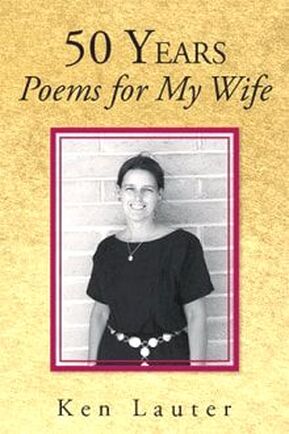
Poems
Xlibris, 2017 - 288 pages
71 photos, half by Judith Lauter
softcover or ebook
The poetic diary of a marriage at the half century mark, this collection
sketches out the life and times of Ken and Judith Lauter. They met in 1965
in a poetry-writing seminar taught by Donald Hall (US Poet Laureate,
2006-07) at the University of Michigan, where they both won Hopwood
Awards for poetry. They have subsequently lived in Tucson, Denver,
St. Louis, Oklahoma City, and their current home, Nacogdoches, Texas.
At Last
At last, my love has come along
- Etta James
She sat halfway down the table,
brown hair, honey tan, white blouse,
eyes down, while Donald Hall
spoke of image, meter, metaphor.
(He and Hall appreciated her
in every way they could.) You must
get to know her! he thought--
Would Hall help? Grinning,
Hall did and he did— at last, at last.
Why Did We Last?
Was it merely genetic,
an evolutionary accident
that braided our minds
and hearts together like
the DNA double helix?
Was it cultural, a middle-
class scent as strong
as some musky perfume?
We were both lonely
in the sad way that just
the smart kids are, knowing
the chances of finding
another one were slim.
Yet we found something
in our faces, bodies, touch
and look, that would prove
indispensable, as much
as our love of language,
the music of poetry heard
deep, deep in the inmost ear.
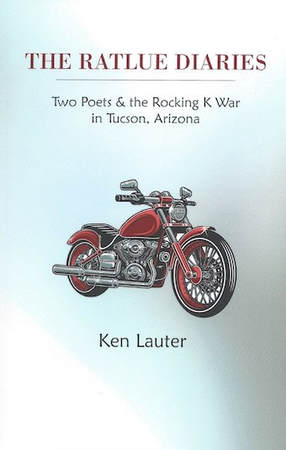
Prose + scattered poems
order from Texas Book Consortium
A fictionalized memoir about an environmental battle, this book records a
five-year struggle to prevent the urbanization of the beautiful Rincon
Valley in Tucson.
Told in poetry and prose by two poets, one of whom is the author's alter ego,
these characters become embroiled in the RockingK War (named after an old
cattle ranch in the valley).
A book with the hair-on-fire gonzo-journalism style of Hunter Thompson: satiric,
profane, rapid-fire, and filled with righteous anger and despair. The poems
alternate between political diatribes and lyrics celebrating the harsh beauty of
the Sonoran Desert.
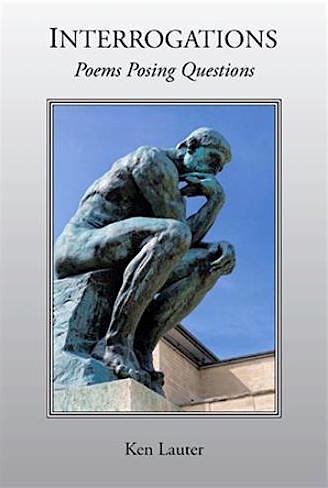
Poems
Xlibris, 2021 - 145 pages
softcover or ebook
These interrogsations deliver 112 poems, each of which contains a question— or several. The poet believes questions are the “engines of poetry” and that interrogating your mind, life history, and environment (both natural and personal) is an essential part of being human.
Yet the book is not solemn or formal. Alternating between abstract and concrete, serious and whimsical, mystical and mundane, Lauter’s inquiries are not part of any premeditated plan or philosophy. They all arose independently, spontaneously, and in a wide variety of circumstances— and are, in essence, fuel for the fire that every poet longs to ignite. In the words of a popular song, he simply asks: What’s going on?
After the Crash
Years ago, after a car crash, while I lay waiting for the ambulance,
I actually finished a poem I had been working on, determined
not to die before I had it right.
- Linda Pastan, in an interview
At the start of the 21st century, car crashes killed more than
than a million people around the world annually.
- Bianca Mugyenyi & Yves Engler, Stop Signs: Cars and Capitalism
After the crash that I’ve never had (yet)
I picture myself lying there, trying
not to look at a mangled limb or blood
oozing down the front of my shirt
and wondering: Should this poem maybe
have rhyme and meter, or be absolutely
free of restraint, roaming like someone
in a car commercial on an empty road
with violins and a gorgeous seashore sunset
persuading me that this car— this exact
model— will fulfill my deepest desires?
Those cars never crash, never throw you
through the windshield onto the cement
of the Ventura Freeway at rush hour
leaving you inchoate as your brain cells
are sputtering out a poem you once loved.
The Condemned Man’s Last Meal
Can I please have
just one more
bite of everything?
Years ago, after a car crash, while I lay waiting for the ambulance,
I actually finished a poem I had been working on, determined
not to die before I had it right.
- Linda Pastan, in an interview
At the start of the 21st century, car crashes killed more than
than a million people around the world annually.
- Bianca Mugyenyi & Yves Engler, Stop Signs: Cars and Capitalism
After the crash that I’ve never had (yet)
I picture myself lying there, trying
not to look at a mangled limb or blood
oozing down the front of my shirt
and wondering: Should this poem maybe
have rhyme and meter, or be absolutely
free of restraint, roaming like someone
in a car commercial on an empty road
with violins and a gorgeous seashore sunset
persuading me that this car— this exact
model— will fulfill my deepest desires?
Those cars never crash, never throw you
through the windshield onto the cement
of the Ventura Freeway at rush hour
leaving you inchoate as your brain cells
are sputtering out a poem you once loved.
The Condemned Man’s Last Meal
Can I please have
just one more
bite of everything?

Poems & Prose
Xlibris, 2021 - 158 pages
softcover or ebook
Where do we live? The standard answer is: on a certain street, in a
county, town, state, country, and continent— but a more
fundamental answer is: in a solar system, in a galaxy among
innumerable galaxies. Cosmic Questions scrutinizes the cosmos for
clues to our ‘residence,’ our identity, and the realities of
Earth.
In both stars and atoms, the poet finds endless awe and a unique
perspective on humanity— one perhaps not comforting in any
simple way, but providing fierce poetic energy. He says in his
introduction: “I could go on writing star poems for the rest of my
life.”
Magnification
I don’t own a telescope, never have, never will--
and yet the stars tell me who I am, where I am,
where I came from, where I’ll go (sooner or later).
They tell me my life was made possible by spheres
of swirling hot gas, exploding billions of miles away.
Let astronomers do their job. Let me do mine.
Neutrinos
The sun sends enormous numbers of neutrinos in all
directions… about 65 billion solar neutrinos per second
pass through every square centimeter of the Earth.
- Wikipedia
The fleet astronomer can bore,
And thread the spheres with his quick piercing mind.
- George Herbert, “Vanity (I)”
OK, so there are billions of neutrinos
drilling through you, your spouse, your dog,
your house, your car, your computer.
Every second of every day they swarm
like occult bees into our lives without
stinging, or even being noticed at all--
No harm, no foul, you say? But if
our minds and bodies are pierced by
anything-- from inner or outer space—
what does that do to what we think we are
and want to be? Earrings swing from
pierced ears. What dangles from a mind?
Ask the Sun
[In the sun] every second, 600 million tons of hydrogen
are being converted into helium. This reaction releases
a tremendous amount of heat and energy.
- Universe Today, Sept. 26, 2008
Busy old fool, unruly sun.
- John Donne, “The Sun Rising”
His self and the sun were one
And his poems, although makings of his self,
Were no less makings of the sun.
- Wallace Stevens, “The Planet on the Table”
_______________________
Fiat [H1+ H1 à 2 H + 3 H] = Lux [4He 3 + 27 Mev]
Why?
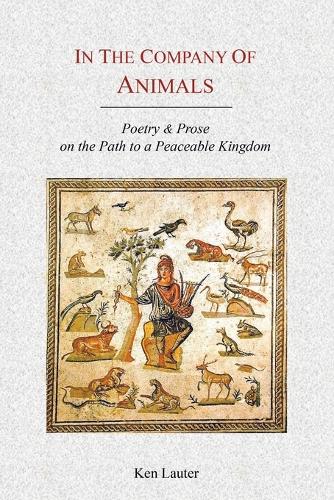
Xlibris, 2021 - 203 pages softcover
Order from SHOP.Peta.com and 100% of the sales price goes to PETA.
This is the story of one man’s relationship with animals across the eighty years of his life, a meditation on humanity’s horrible history of animal abuse, and an impassioned plea for the end of speciesism. The poet went vegetarian in 1976, and still struggles to go vegan — but is convinced that non-human animals must be fully liberated if our own species is to have a sustainable future or a sane social/spiritual life. The book doesn’t “preach” its message, but embodies it in a wide variety of work (90 poems; 12 prose pieces). For both animal-lovers and animal-eaters, the voyage through these pages will prove memorable— and perhaps even life-changing.
This book will be of keen interest to many a poetry-lover— but it also offers inspiration to anyone who feels a burning need to abolish speciesism. The author is passionately dedicated to animal liberation and what he calls the “Empathy Revolution,” a kind of next step after the Darwinian Revolution. It is something he believes can– and will– redefine the future of the human species in ways that his poems foreshadow. - Ingrid Newkirk, President, PETA
- from the Introduction -
Empathy for animals has become a core part of my identity,
shaping what Wordsworth called “the growth of a poet’s mind.”
[but] this book will succeed or fail, not because of its
animal-rights agenda, but because of the quality (or lack of it)
in its poems. I ask for no other standard— even as I ponder
the enigma posed by Matseo Bashó four centuries ago.
What fish feel,
birds feel, I don’t know—
the year ending
________________________________________________________________________
Minority Rule
97 percent of all animals are invertebrates.
1.25 million species have been described,
most of which are insects, and there are
millions more to be discovered. The total
number of invertebrate species could be
5, 10, or even 30 million, compared to just
60,000 vertebrates.- Wikipedia
So why do certain vertebrates
assume they
and they alone
get to cast
the deciding vote?
Answering Thoreau
Who hears the fishes when they cry?
- Henry David Thoreau, 1849
I hear them.
Once I did not.
Now I do.
Once I hooked them
kidnapped them
dismembered them.
Once I ate them
fried, baked, broiled.
So delicious!
Forgive me, Henry David.
Forgive me, fish.
Now I hear you.
Blue Jay in the Birdbath
After he flits down into
the small pool, he goes nuts--
frothing the water in a fast-
forward blurring sparkle--
droplets popping up over his head,
back, wings, releasing
explosions of Corvidae joy.
Then he shoots up again
to a pine branch, where
he perches, wipes his head
with one wing, shakes
his tail once, and sighs,
glistening, glistening,
a blue-white god of flight.
Cows by the Creek - for Joaquin Phoenix
Each year, more than 300 million cows are shipped to slaughterhouses
and killed for their flesh and skin. That’s 821,917 every day… - PETA
A small group of herd of Herefords grazed on a the hillside
just across the creek behind our house.
I could heard their low, slow calls on summer evenings.
just as the sun was going down.
Then I had to stop playing in the backyard and go,
inside, where Mother was cooking frying hamburgers.
I loved them-- gobbled them like a starved wolf,
not thinking for a second about the cows
or the great evening bovine vespers they sang.
It took me a lifetime to learn the words of their song.
Watching a Cat
The cat pads
precisely
among marigolds
bites
at moths
licks dew
and pounces
on ghost mice.
- Apple Valley, MO - 1996
Euphemisms
[Factory] farms have been caught engaging in
“depopulation” of animals (i.e., killing them)
via ventilation shutdown (VSD), in which
ventilation is eliminated in order to suffocate
the animals, as well as “VSD Plus,” which
also incorporates heat, humidity, and carbon dioxide--
suffocating them and baking them alive… – PETA
Atrocities ride on the backs of words— like
ventilation shutdown and depopulation.
They don’t issue from true human/e throats.
They burp from demons, deformed beings
who inhabit a region of smothering darkness.
The Nazis turned der Jüdin and der Jude
into Abschaum, or ‘scum’ with just a twitch
of the lips, a sneer, a sniggering whisper.
Badeanstalten were gas chambers disguised
as bathhouses - for a quick cool shower.
So don’t fall for the vile euphemisms of food--
sirloin, brisket, ‘chicken nuggets,’ lamb ragu,
kofta, ham, and bacon— pretty words for flesh
ripped from those who could not say: Mercy!
The Good Life
1) Animals
Elk graze in mountain meadows.
Beavers eat leaves and flowers.
Camels love grain and water.
Sheep chew grass, leaves, & roots.
Given half a chance
predators will eat you--
so stay out of their territory
and you’ll be fine.
2) Plants
O photosynthesis!
O chlorophyllic miracle!
Plants grow and grow
around the globe.
Plants and the sun
are dancing together.
They may not be gods--
but they’re close enough.
The Animal You Need
The animal you need is not
some old hobby horse
or an endangered creature
far off in a distant jungle.
It’s not the rescue animal
left starving on the street
by someone who grew
tired of a puppy in a month.
It’s not a circus elephant who
crushed the psycho-keeper
who tasered the animal for years.
Blessed be all those beasts.
But look harder, further, deeper.
It is the animal beneath all
your fears, joys, and hopes.
The animal you need is you.
________________________________________________________________
from the Afterword - What Do I Hope For?
* For miracles, of course. For all the feedlots, factory farms,
and slaughterhouses to be shut down tomorrow.
* For everyone to join PETA– or Mercy for Animals, or DxE,
or Animal Equality, or the Humane Society, or the
the International Fund for Animal Welfare, or any other
organization of compassion, science, and common sense–
and escape the perverted logic of meat.
* For just one person in the world to read this book, take up
a plant-based diet, and consequently spare a farm animal
that would otherwise be murdered.
* For this book to hit the New York Times bestseller list
and send Billy Collins into a jealous rage.
Order from SHOP.Peta.com and 100% of the sales price goes to PETA.
This is the story of one man’s relationship with animals across the eighty years of his life, a meditation on humanity’s horrible history of animal abuse, and an impassioned plea for the end of speciesism. The poet went vegetarian in 1976, and still struggles to go vegan — but is convinced that non-human animals must be fully liberated if our own species is to have a sustainable future or a sane social/spiritual life. The book doesn’t “preach” its message, but embodies it in a wide variety of work (90 poems; 12 prose pieces). For both animal-lovers and animal-eaters, the voyage through these pages will prove memorable— and perhaps even life-changing.
This book will be of keen interest to many a poetry-lover— but it also offers inspiration to anyone who feels a burning need to abolish speciesism. The author is passionately dedicated to animal liberation and what he calls the “Empathy Revolution,” a kind of next step after the Darwinian Revolution. It is something he believes can– and will– redefine the future of the human species in ways that his poems foreshadow. - Ingrid Newkirk, President, PETA
- from the Introduction -
Empathy for animals has become a core part of my identity,
shaping what Wordsworth called “the growth of a poet’s mind.”
[but] this book will succeed or fail, not because of its
animal-rights agenda, but because of the quality (or lack of it)
in its poems. I ask for no other standard— even as I ponder
the enigma posed by Matseo Bashó four centuries ago.
What fish feel,
birds feel, I don’t know—
the year ending
________________________________________________________________________
Minority Rule
97 percent of all animals are invertebrates.
1.25 million species have been described,
most of which are insects, and there are
millions more to be discovered. The total
number of invertebrate species could be
5, 10, or even 30 million, compared to just
60,000 vertebrates.- Wikipedia
So why do certain vertebrates
assume they
and they alone
get to cast
the deciding vote?
Answering Thoreau
Who hears the fishes when they cry?
- Henry David Thoreau, 1849
I hear them.
Once I did not.
Now I do.
Once I hooked them
kidnapped them
dismembered them.
Once I ate them
fried, baked, broiled.
So delicious!
Forgive me, Henry David.
Forgive me, fish.
Now I hear you.
Blue Jay in the Birdbath
After he flits down into
the small pool, he goes nuts--
frothing the water in a fast-
forward blurring sparkle--
droplets popping up over his head,
back, wings, releasing
explosions of Corvidae joy.
Then he shoots up again
to a pine branch, where
he perches, wipes his head
with one wing, shakes
his tail once, and sighs,
glistening, glistening,
a blue-white god of flight.
Cows by the Creek - for Joaquin Phoenix
Each year, more than 300 million cows are shipped to slaughterhouses
and killed for their flesh and skin. That’s 821,917 every day… - PETA
A small group of herd of Herefords grazed on a the hillside
just across the creek behind our house.
I could heard their low, slow calls on summer evenings.
just as the sun was going down.
Then I had to stop playing in the backyard and go,
inside, where Mother was cooking frying hamburgers.
I loved them-- gobbled them like a starved wolf,
not thinking for a second about the cows
or the great evening bovine vespers they sang.
It took me a lifetime to learn the words of their song.
Watching a Cat
The cat pads
precisely
among marigolds
bites
at moths
licks dew
and pounces
on ghost mice.
- Apple Valley, MO - 1996
Euphemisms
[Factory] farms have been caught engaging in
“depopulation” of animals (i.e., killing them)
via ventilation shutdown (VSD), in which
ventilation is eliminated in order to suffocate
the animals, as well as “VSD Plus,” which
also incorporates heat, humidity, and carbon dioxide--
suffocating them and baking them alive… – PETA
Atrocities ride on the backs of words— like
ventilation shutdown and depopulation.
They don’t issue from true human/e throats.
They burp from demons, deformed beings
who inhabit a region of smothering darkness.
The Nazis turned der Jüdin and der Jude
into Abschaum, or ‘scum’ with just a twitch
of the lips, a sneer, a sniggering whisper.
Badeanstalten were gas chambers disguised
as bathhouses - for a quick cool shower.
So don’t fall for the vile euphemisms of food--
sirloin, brisket, ‘chicken nuggets,’ lamb ragu,
kofta, ham, and bacon— pretty words for flesh
ripped from those who could not say: Mercy!
The Good Life
1) Animals
Elk graze in mountain meadows.
Beavers eat leaves and flowers.
Camels love grain and water.
Sheep chew grass, leaves, & roots.
Given half a chance
predators will eat you--
so stay out of their territory
and you’ll be fine.
2) Plants
O photosynthesis!
O chlorophyllic miracle!
Plants grow and grow
around the globe.
Plants and the sun
are dancing together.
They may not be gods--
but they’re close enough.
The Animal You Need
The animal you need is not
some old hobby horse
or an endangered creature
far off in a distant jungle.
It’s not the rescue animal
left starving on the street
by someone who grew
tired of a puppy in a month.
It’s not a circus elephant who
crushed the psycho-keeper
who tasered the animal for years.
Blessed be all those beasts.
But look harder, further, deeper.
It is the animal beneath all
your fears, joys, and hopes.
The animal you need is you.
________________________________________________________________
from the Afterword - What Do I Hope For?
* For miracles, of course. For all the feedlots, factory farms,
and slaughterhouses to be shut down tomorrow.
* For everyone to join PETA– or Mercy for Animals, or DxE,
or Animal Equality, or the Humane Society, or the
the International Fund for Animal Welfare, or any other
organization of compassion, science, and common sense–
and escape the perverted logic of meat.
* For just one person in the world to read this book, take up
a plant-based diet, and consequently spare a farm animal
that would otherwise be murdered.
* For this book to hit the New York Times bestseller list
and send Billy Collins into a jealous rage.

